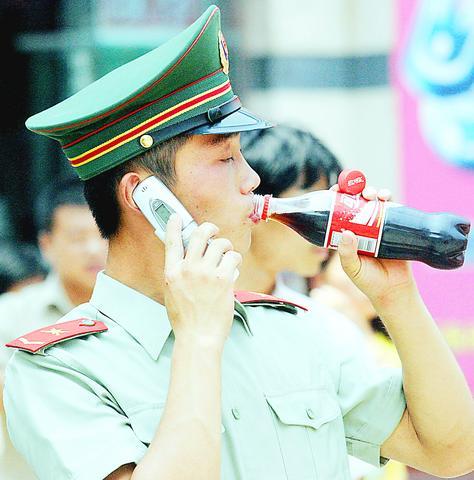China's military staged its first parade in Hong Kong yesterday, with 3,000 soldiers marching crisply in formation as others rode in armored vehicles and helicopters, as part of efforts by Beijing to boost patriotism and soothe lingering political tensions.
The People's Liberation Army (PLA) invited all of Hong Kong's pro-democracy lawmakers to the event at a barracks on the outskirts of town, and those who attended said they were impressed.

PHOTO: AP
"They are very well-trained and disciplined and leave us with a lasting impression," said Hong Kong's top opposition party leader, Yeung Sum (
Beijing's move was seen as a conciliatory gesture to politicians it viewed as troublemakers -- some of whom were barred from entering China -- but also one with a bit of a barb because the pro-democracy figures would seem a bit out of place standing at attention to watch the PLA march past.
LONG SHADOW
The pro-democracy figures hold annual candlelight vigils commemorating the deaths of hundreds if not thousands of unarmed people in a PLA crackdown on pro-democracy activists in Beijing in 1989.
Despite Beijing's apparent goodwill gesture, Yeung didn't think it was a breakthrough.
"This is just a ceremony and not real communication," Yeung said, adding that they didn't have a chance to talk with mainland officials at the event.
Yeung said he hopes the opposition can visit Beijing and discuss democracy with Chinese leaders after September's legislative elections.
Yesterday, the Chinese soldiers -- decked out in neat green uniforms and carrying rifles -- marched to mark the 77th anniversary of the PLA, which won control of China for Mao Zedong's (
The army has maintained a presence here since Britain handed Hong Kong back to China on July 1, 1997, but its troops generally stay in their barracks and keep an extremely low profile.
Their arrival seven years ago was greeted with suspicion by many Hong Kong people, who were shocked by the use of tanks and troops against the Tiananmen Square pro-democracy movement in Beijing on June 4, 1989.
Still, yesterday's parade generated intense interest in Hong Kong. Cable TV reported that people began lining up before dawn to get a good vantage point.
Chinese officials say they staged the parade to enhance the relationship between the army and Hong Kong's people.
The parade "displays the army's strength and determination to maintain Hong Kong's prosperity and stability," said Wang Jitang, commander of the PLA's Hong Kong garrison.
ELECTION FEARS
But it comes at a time when the Hong Kong and Beijing governments fear the outcome of September elections in which ordinary people will directly choose 30 of 60 legislative seats.
The voters are expected to side overwhelmingly with anti-government and pro-democracy candidates, which could spell political trouble for Chief Executive Tung Chee-hwa (
Hong Kong people are unhappy with Tung, who was picked by a pro-Beijing committee, but China ruled in April that residents cannot democratically choose his successor in 2007 or all lawmakers in 2008.

MAKING WAVES: China’s maritime militia could become a nontraditional threat in war, clogging up shipping lanes to prevent US or Japanese intervention, a report said About 1,900 Chinese ships flying flags of convenience and fishing vessels that participated in China’s military exercises around Taiwan last month and in January last year have been listed for monitoring, Coast Guard Administration (CGA) Deputy Director-General Hsieh Ching-chin (謝慶欽) said yesterday. Following amendments to the Commercial Port Act (商港法) and the Law of Ships (船舶法) last month, the CGA can designate possible berthing areas or deny ports of call for vessels suspected of loitering around areas where undersea cables can be accessed, Oceans Affairs Council Minister Kuan Bi-ling (管碧玲) said. The list of suspected ships, originally 300, had risen to about

DAREDEVIL: Honnold said it had always been a dream of his to climb Taipei 101, while a Netflix producer said the skyscraper was ‘a real icon of this country’ US climber Alex Honnold yesterday took on Taiwan’s tallest building, becoming the first person to scale Taipei 101 without a rope, harness or safety net. Hundreds of spectators gathered at the base of the 101-story skyscraper to watch Honnold, 40, embark on his daredevil feat, which was also broadcast live on Netflix. Dressed in a red T-shirt and yellow custom-made climbing shoes, Honnold swiftly moved up the southeast face of the glass and steel building. At one point, he stepped onto a platform midway up to wave down at fans and onlookers who were taking photos. People watching from inside

Japan’s strategic alliance with the US would collapse if Tokyo were to turn away from a conflict in Taiwan, Japanese Prime Minister Sanae Takaichi said yesterday, but distanced herself from previous comments that suggested a possible military response in such an event. Takaichi expressed her latest views on a nationally broadcast TV program late on Monday, where an opposition party leader criticized her for igniting tensions with China with the earlier remarks. Ties between Japan and China have sunk to the worst level in years after Takaichi said in November that a hypothetical Chinese attack on Taiwan could bring about a Japanese

The WHO ignored early COVID-19 warnings from Taiwan, US Deputy Secretary of Health and Human Services Jim O’Neill said on Friday, as part of justification for Washington withdrawing from the global health body. US Secretary of State Marco Rubio on Thursday said that the US was pulling out of the UN agency, as it failed to fulfill its responsibilities during the COVID-19 pandemic. The WHO “ignored early COVID warnings from Taiwan in 2019 by pretending Taiwan did not exist, O’Neill wrote on X on Friday, Taiwan time. “It ignored rigorous science and promoted lockdowns.” The US will “continue international coordination on infectious